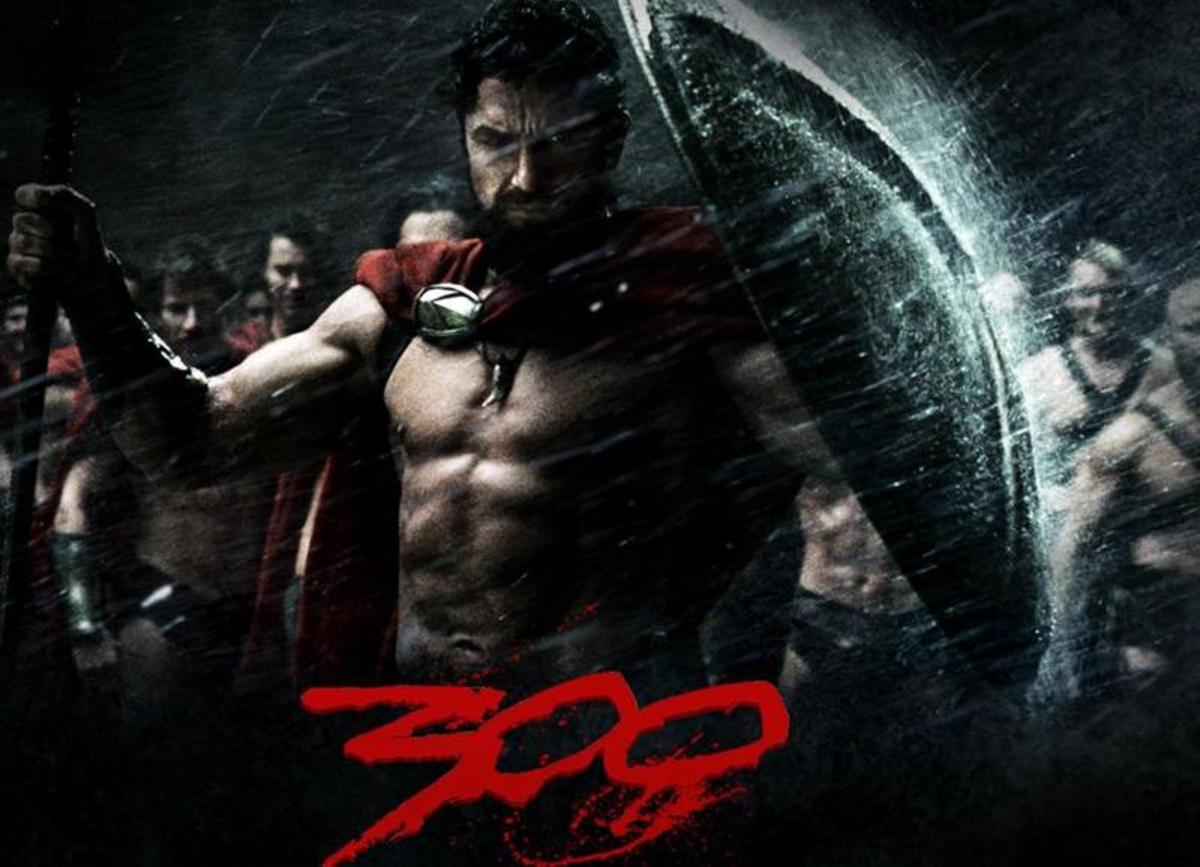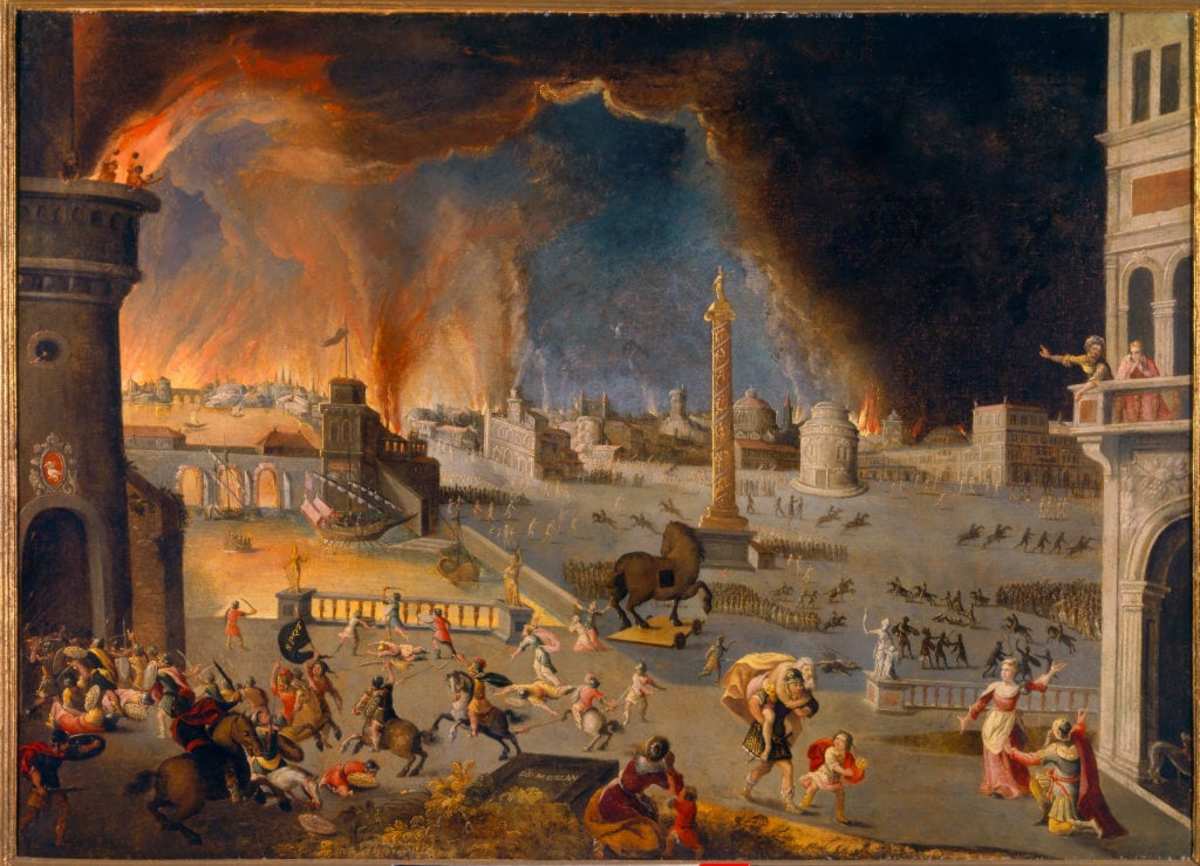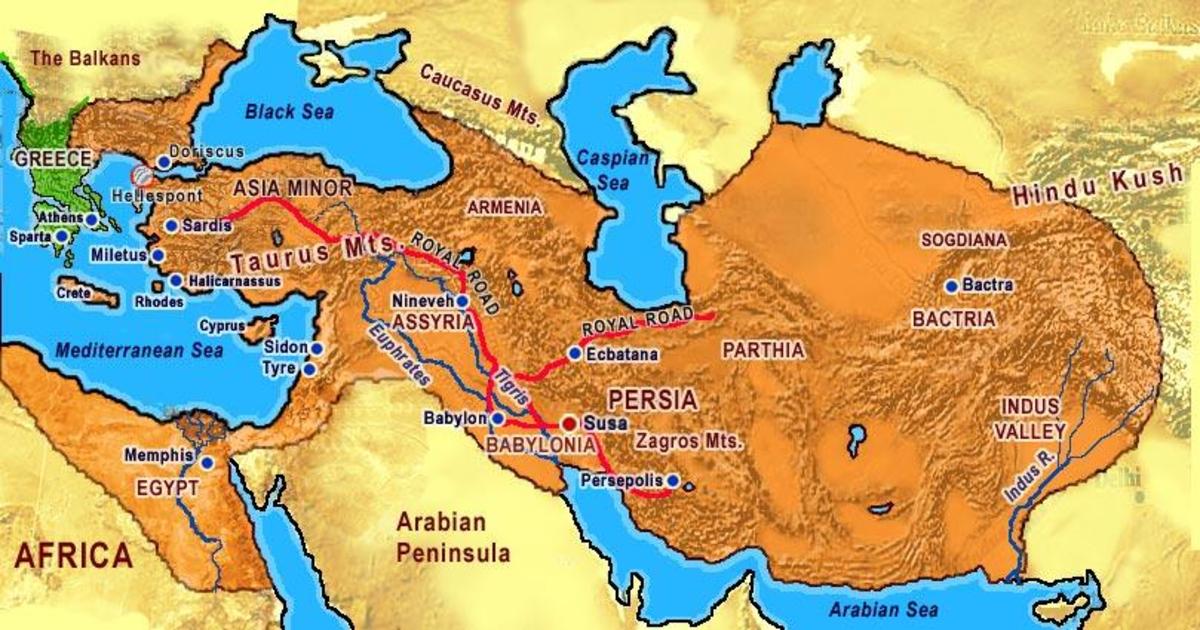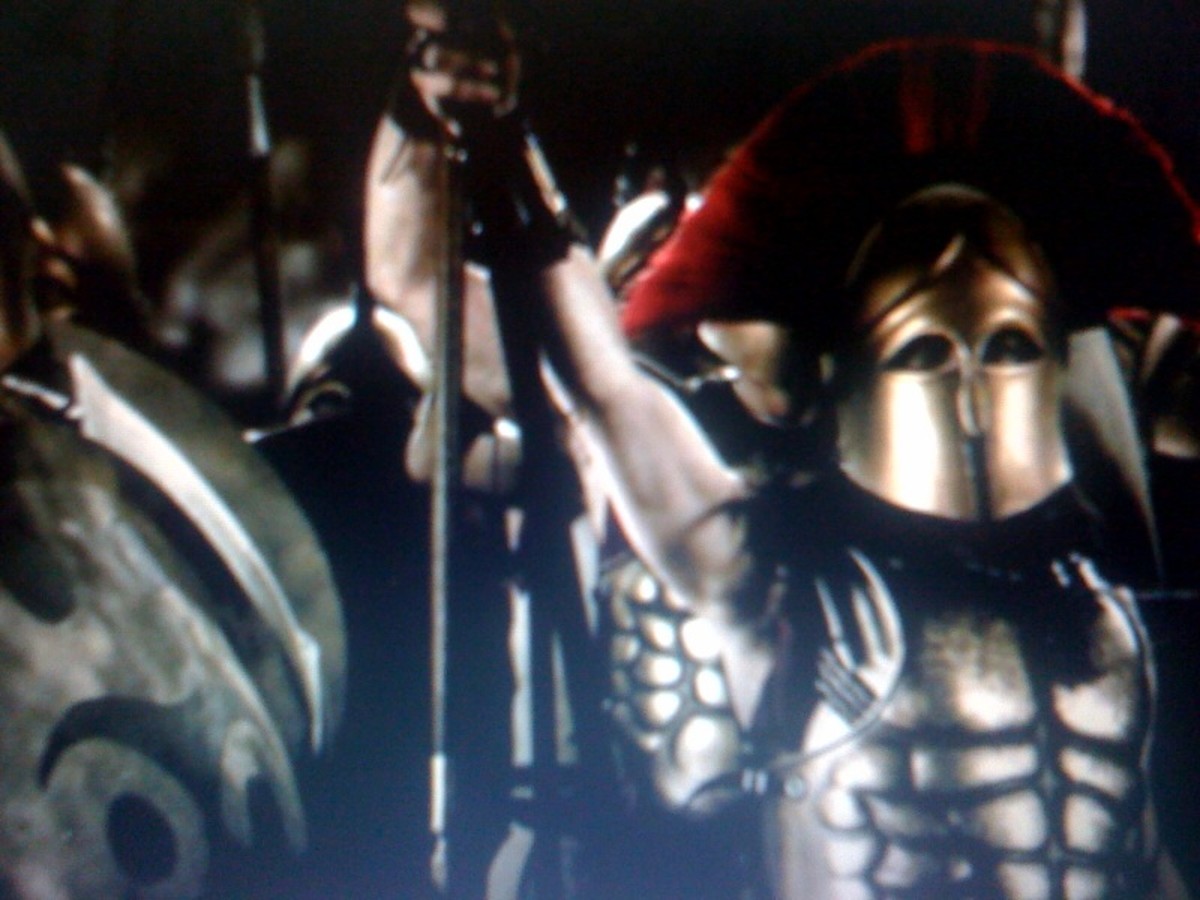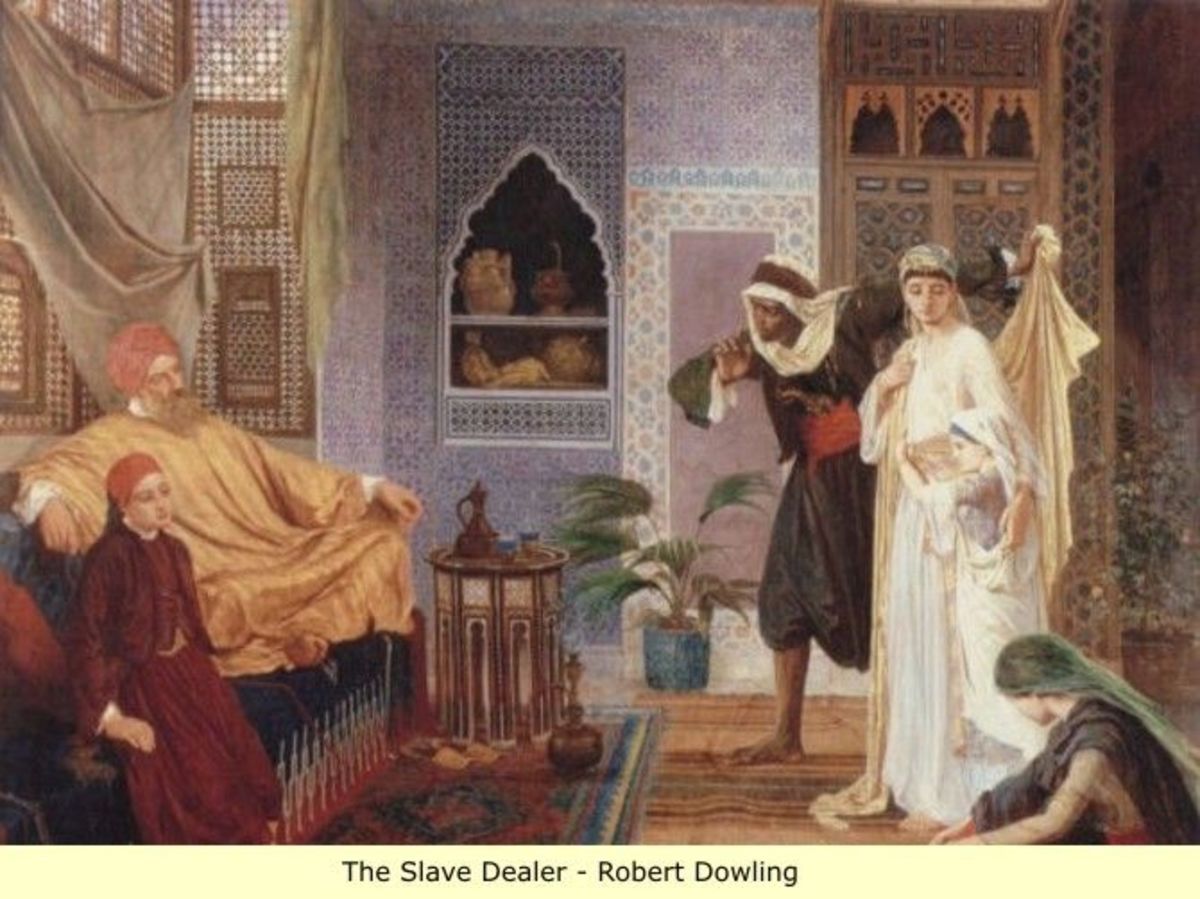Politics and the Peloponnesian War
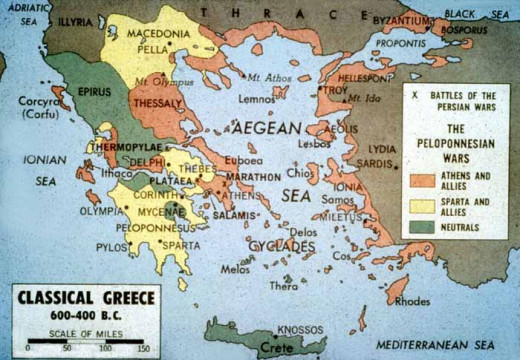
Politics and the Peloponnesian War.
The Peloponnesian war was fought from 431 BCE to 404 BCE between two powerful alliances of Greek city states; one led by Ionic, democratic, intellectual, and trade focused Athens and the other by Doric, Oligarchic, conservative and xenophobic Sparta.[1] The clash was not just a clash between two rival cities or alliances; but was in fact a politically motivated struggle between two opposing ideas of what it meant to be Greek. The lead up to war and much of the war itself has some definite similarities to the Cold War of the 20th century that took place between Democratic America and Western Europe on one side and the Communist USSR on the other. The cold war never came to blows; but the ancient Greeks were not lucky enough to have a substantial deterrent to war. Both struggles however were politically motivated and in both the opposing powers fought to push their political beliefs on the territories they held power over. The war had lasting impact on Greek culture; not only did it shift the center of Greek power in the short term, but the war and its impacts had a profound effect on philosophical thought for eons to come. At its heart, the Peloponnesian war was a battle for the soul of Greece. It was a political struggle between opposing ideas as well as opposing armies.
The Delian League was the alliance of Greek city-states that was led by Athens. It was formed originally as an alliance of cities that opposed the incursion of Persian Emperors into Greek lands and the cities that joined were happy to follow Athens lead in battling the mighty empire. [2] While the original intent of the league was opposing foreign incursions it soon became clear to Athenian politicians that the league could be a powerful tool for extending Athenian power and influence; particularly the Athenian politician and orator Pericles. When Athens moved the treasury of the “Delian” League from Delos to Athens itself the democratic city was suddenly able to spend the money any way the assembly saw fit. Therefore the league truly became an Athenian Empire. [3] This move was justified by saying that the treasury was too vulnerable to Persian naval attack and consequently the whole treasury might be lost before the League could effectively fight the eastern invader. While this may have been true, the fact was that since Athens held the money itself it had predominantly become tribute; a fact that Athens reinforced whenever a Delian League member tried to opt out of the league, or even seemed to be a threat to its unity.[4] One example is when war with Corinth was looming in the lead up to the wider Peloponnesian War; the Athenians demanded that the Potideans (who were colonists of Corinth) tear down their sea walls and submit to an Athenian occupation force. [5] This was not in response to a direct threat from the Potideans. The Potideans were suspected simply because they were colonists of Corinth. Of course this demand was rejected and the unfortunate Potideans were put under siege, merely because they represented a potential threat. If Athens thought there might be a problem with a member city it was quick to take action to bring them back into line for fear that any rebellion could spark general unrest in what had truly become an empire.
The expansion of Athenian power was likely a conscious effort by leading Athenian politicians, especially Pericles to oppose Spartan power and its position as the leader of Greece. [6] The league was first formed because many Greek cities began to doubt Sparta’s ability and sincerity in leading them against Persia.[7] Pericles himself certainly advocated for an Athens that stood as a model of democracy for Greek cities and he ensured through his political influence that Athens actively promoted democracy among it’s tributaries in the Delian League; he said that Athens was an education to Greece. [8] So this very important Athenian general and politician held that Athens should be the model for other Greek cities to follow and that it was Athens and not Sparta that should be the leading city of Hellas because it was a superior and more enlightened example to the rest of the country.[9][10] Pericles believed that government should justify its existence by actually developing a better society; and he used all of his enormous influence in Athens to push this policy that was the polar opposite of the Spartan position. So the Athenian opinion was very different from not only Sparta’s opinion, but that of the rest of the world at that time. Athens had ambitions to hold and extend its power for the purpose of spreading the virtues of Athenian style democracy, trade, and intellectual life to the rest of Greece. They did so because the people of Athens believed that these things would net a positive benefit for the Greeks. Compare this to the naked glory-seeking of the Imperial monarchs of the east, who sought to expand their power for their own glorification as the ruler who conquered “X” people and “X” place. They didn’t care about ideas very much, just their own power and legacy. In a way the Athenian drive for change, trade, and spreading “freedom” through military and economic pressure is a parallel to the middle-class liberalism of the 19th century; it wasn’t empire for empires sake, but instead it was empire (supposedly) for the sake of spreading ideas and enlightenment.
The Spartan position was as very much close to the opposite politically as it could be in the context of the times. The Peloponnesian League began to be formed after Sparta defeated the city of Tegea (sometime between 560-550 BCE) and instead of administratively taking it over (like they had done to Messenia, from whence they drew their Helots, or serfs) they forced it into a mutual defense treaty with conditions that favored Sparta. This proved to be a stroke of genius, and city-by-city the Spartans forced each city in the Peloponnesus into similar treaties with the notable exception of Argos and a few others. The truly odd thing about what we call the Peloponnesian “League” was that it was not a league or confederation at all in the modern sense, but really just a collection of treaties that bound the cities of the Peloponnesus to Sparta. [11][12] Corinth, for example was not bound to fight alongside Mantinea should it be attacked; and battles between “League members” did happen on occasion[13]. So this “League” was really just a carefully constructed defensive ring meant to protect Sparta from incursion. This fit very well with the conservative outlook of Sparta’s ruling class; they were interested in maintaining the status quo; not in expanding Spartan power, not in expanding Spartan political influence. Thucydides said of the Spartans:
“…for Lacedaemon (Sparta), after that it was built by the Dorians that inhabited the same… it had for the longest time good laws, and always been free from tyrants; for it is unto the end of this war four hundred years and something more that the Lacedaemonians have used one and the same government…” [14]
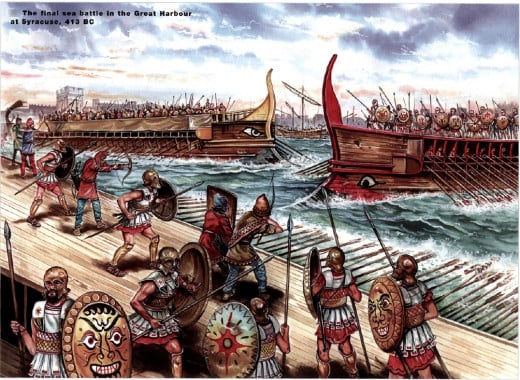
The Spartans wanted to maintain their system in which their young men grew into the toughest warriors on earth in the Agoge; the purpose being to deter other cities from warring with them and also to keep the Messenia serfs (Helots) in line. Fear that the Helots, who outnumbered the Spartans 7 to 1, would revolt and overthrow the whole Spartan system was in many ways the driving force behind Spartan policy. Spartan hegemony over Greece was built, then, on this tenuous political structure that revolved around maintaining a deterrent of superior military force to keep other cities and the helots in line.[15] When the Spartans marched against the Persians it was not because the city harbored Panhellenic ambitions (though one King Pausanias did[16]) for itself, but because it wanted to prevent change to the Greek political structure that could possibly upset the spider-web of alliances that made the unique Spartan political system possible.[17] Therefore, the growing power of Athens was a concern to the Spartan leadership and probably a leading cause of the Spartan elders deciding to go to war against Athens. [18] Sparta’s overall defensive posture meant a domestic focus for the Spartan government; but they were not blind to the fact that Athens was slowly overtaking them as the leading city of Greece.
Athens based its power on two things: trade and its mighty navy. The building of the latter was a direct reaction to the growth of the former. Trade became more and more important to Athens as its political reach went further and further into the sea; first the Aegean, but eventually the Delian League contained every major Greek inhabited island except Crete; it even controlled some Ionian cities, and cities as far away as Byzantium on the Straits of Marmara. Open trade among tributary cities was the key to the rise of Athenian power. The meager yields of Attic farmland was not near enough to sustain the growing population of the city, and so fish from the Black Sea and Wheat from the fields of Tauris[19] were essential for the cities survival. In fact, they imported so much food that the fields of Attica could be completely occupied by the Spartan army for years and the city was able to fight on. The Athenian strategy for the war reflected their style of expansion and their philosophy on what it meant to be Greek. They didn’t meet the Spartans in the field for a massive Hoplite battle, as would have been traditional; for they would surely have lost such a contest being both outnumbered and facing the world’s best-trained soldiers. Instead they decided to leverage their economic might and naval power to attack Spartan possessions where they were weakest and to strangle the resources of the Peloponnesian League. Theirs was to be a war of attrition; this being the idea masterminded by Pericles.[20] Pericles was also the man who used Delian League funds to beatify Athens with massive construction projects whose legacy still marks the landscape of the city. In Pericles’s time Athens was a patron of the arts and philosophy, though not many Athenians themselves were philosophers; most actually came from Ionian-allied cities. Methon was a virtuoso mathematician whose contributions to the skyline of Athens were immense; he helped design the Parthenon for example. The climate in Athens was such that it bred the great philosopher Socrates, whose pupil Plato would go on to become one of the most influential thinkers of Western society.
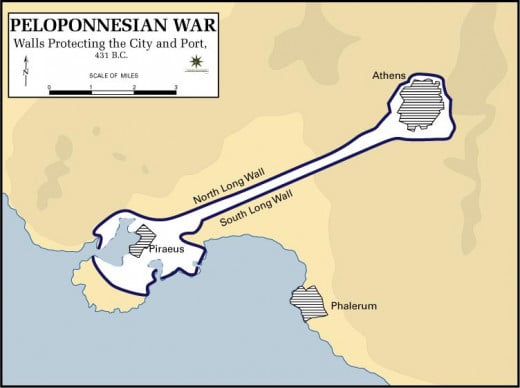
The Spartan strategy for war fit their approach to “being Greek” as well. It was the simplest, most traditional Greek way of settling disputes: they would show up outside Athens and devastate the farmlands in an attempt to coax the Athenians out. This was an attempt to humiliate them into fighting; if there was any doubt about this being a traditional strategy one needs only to reference the more ancient Illiad to see that Agamemnon (who was himself from Sparta) used the same strategy to get Paris to fight him one-on-one.[21] Of course given the strategy Athens adopted and the fact that the city was not dependent upon its fields for nourishment made this strategy a poor one. Sparta’s leadership was sure that the Athenians would be too embarrassed not to come out and fight, and as discussed above the Spartans knew they would surely carry the field in a direct confrontation.[22] Once again this fit well with the traditional mode of Greek fighting and was exactly the kind of low-risk policy the Spartans were ready to take on. When the Spartans did eventually win the war, they did so by accepting Persian money that allowed them to buy a fleet larger than the Athenian one and defeat it at sea. Once the Athenian fleet was defeated the city could no longer ensure its food supply and had to surrender. It is somewhat interesting to compare this real life event to the Iliad once again; for the Mycenaean strategy failed for the very same reasons at first; and only succeeded when they adopted the sort of trickery they had earlier dismayed at. The Spartans likewise abandoned their own methods of fighting and adopted a style more suited to their opponents in order to win the war. The fact that the Spartans essentially bought their victory on borrowed Persian money and in fact abandoned their traditions to win would have reverberations that led to their hegemony being a short one.[23] The comparison with the fictional Iliad to the very real events recorded by Thucydides is instructive; it sheds light on just how traditional the outlook of the Spartans was on warfare; they still wanted to fight wars the way they believed their ancestors had: man-to-man and blade-to-blade. Ultimately Sparta abandoned its methods of fighting if not its political outlook; which was strengthened by winning the war.
Both of the major players in the conflict took it upon themselves to force their style of politics on those enemies they managed to conquer in the course of the war. The Athenians overthrew the nobility and set up democracies and the Spartans installed Oligarchies made up of local nobles wherever they won new cities. In this way the war was a political struggle. When the Spartans finally occupied Athens itself they set up an oligarchy known as “The thirty Tyrants” which was a strategy they used on many cities they took control of during the war. Though the oligarchy set up at Athens lasted only a few years before being overthrown by a democratic revolution[24] the loss of the war by Athens did discredit democracy in general throughout Greece. Though Sparta won the war by adopting Athenian methods of fighting; it was still oligarchy that was politically the victor. The appeal of democracy to many Greek cities had been the successful example of a powerful Athens; but after they lost the war many of the mistakes they made during it began to be attributed to democracy itself. [25]
The effects of this discrediting of democracy would have a ripple effect for a very long time because of the writings of Plato. Plato was born in Athens during the Peloponnesian War, and was a young adult when Athens fell. A common view of democracy after Athens fell was that it led to bad decision making; and this was reflected in Plato’s works; especially the Republic.[26] Consider this quotation from The Republic:
“Well, I said, and how does the change from oligarchy into democracy arise? Is it not on this wise? --The good at which such a State aims is to become as rich as possible, a desire which is insatiable?
What then?
The rulers, being aware that their power rests upon their wealth, refuse to curtail by law the extravagance of the spendthrift youth because they gain by their ruin; they take interest from them and buy up their estates and thus increase their own wealth and importance?
To be sure.
There can be no doubt that the love of wealth and the spirit of moderation cannot exist together in citizens of the same State to any considerable extent; one or the other will be disregarded.”[27]
The fact that Plato came to the conclusion that democracy was a part of the problem, that money was bad, and that justice should be the primary concern of the state is very good evidence that not only was democracy discredited, but the whole Athenian political outlook, focused on democracy, trade and economic power was as well. By comparison, Spartan full citizens, before they fought and won the Peloponnesian war, did not engage in economic activity of any kind or keep gold.[28] They disavowed money, willingly submitted to whatever their leaders ordered, and were primarily concerned with maintaining their balanced system. A reflection of the Spartan system of government is thus in evidence in the works of Plato when he deals with what the best kind of government would be. Plato didn’t follow the Spartan system completely, preferring one King to a multitude of rulers, but he was certainly against the idea of Democracy. Later Platonists and Neo-Platonists praised Sparta and its constitution specifically. In “On Sparta” by Plutarch the Neo-Platonist author heaps praise on the founder of the Spartan constitution: Lycurgus. As is well known Plato’s philosophy went on to form the basis of much of western philosophy for a very long time; in fact it became deeply intertwined with Christianity due to the writings of respected Christian theologians like Augustine of Hippo; who was a Neo-Platonist himself before converting to Christianity.[29] So the political implications of Spartan victory were not just those that had an immediate effect on the Greeks of the time. Greek philosophy of the time was important enough that it continued to effect political thought well into the Renaissance and even beyond. The Athenian loss led the rising tide of democracy to a great and long-lasting downfall.[30] Spartan ideas became popular while Athenian ones faded away. The fact that Sparta itself changed dramatically after victory brought it new wealth further reinforced this view. As stated, the Spartans were not trying to specifically engineer a long-term political philosophy; but nonetheless a “dim reflection” of their political philosophy has been passed down even to our generation through the works of Plato.
The Peloponnesian war was one fought not over any specific land, trade route, or economic resource. Instead it was a battle over who would be the leading city of Greece. The two main contenders were politically opposite of each other in several keys ways. Though the war was long and hard fought on both sides; and even though the Spartans eventually won by borrowing Persian money their victory nonetheless discredited democracy in Greek eyes. The war was a political struggle; and the side that won shifted the slow march towards democratic government occurring in Greece at the time instead towards a preference for a strong government, with powerful leaders that led armies into battle. Philosophy, art and architecture did not disappear; nor was Athens totally wrecked as a city, but in the end it had lost the battle for control over the soul of Greece.
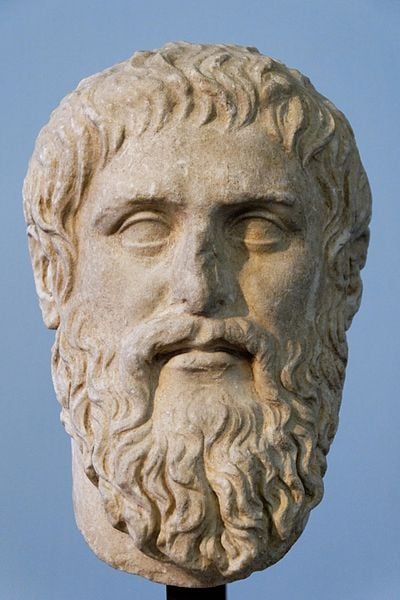



Footnotes
[1] Kagan, Donald. The Peloponnesian War. (New York: Viking, 2003.) Pages 118-119, 125 and 128. Drawing on Thucydides and Xenophon
The Term Ionic refers to those Greeks who originated in Ionia in Modern Turkey. Doric refers to those Greeks who were part of the Dorian invasion of Greece from the north that came around 1200 BCE. Both were Greek in culture; but the average Greek was keenly aware of the differences.
[2] Bowra, C.M. Periclean Athens. (New York: The Dial Press, 1971),
89.
[3] ibid.
[4] Thucydides, . "The Peloponnesian War." Book . 114 Page 64
[5]Kagan, Donald. The Peloponnesian War. (New York: Viking, 2003.) 39. Drawing on Thucydides.
[6] Bowra, C.M. Periclean Athens. (New York: The Dial Press, 1971), 108.
[7] Cartledge, Paul. The Spartans. (New York: The Overlook Press, 2003), 144.
[8] Bowra, C.M. Periclean Athens. (New York: The Dial Press, 1971), 108 – 110. Here Bowra is Drawing on Thucydides.
[9] ibid
[10] Thucydides, "Pericles' Funeral Oration from the Peloponnesian War." (Fordham University.) See Pericles’ optimistic descriptions of the supposed bright future of Athenian democracy.
[11] Kagan, Donald Kagan. The Outbreak of the Peloponnesian War. (Ithaca, NY: Cornell University Press, 1969), 13. Drawing on Thucydides.
[12] Thucydides, "The Peloponnesian War." 1.19
[13] ibid. The Spartans did sometimes have to fight to maintain their prominent position against “League” members too; though fear of the mighty Spartan warriors kept this sort of thing to a minimum.
[14] Thucydides, "The Peloponnesian War." 1.18. Emphasis Added
[15] ibid 4.80
[16] Cartledge, Paul. The Spartans. (New York: The Overlook Press, 2003), 144. Drawing on Thucydides and Xenophon.
[17] Kagan, Donald. The Peloponnesian War. (New York: Viking, 2003.) 43. Drawing on Thucydides.
[18] ibid
[19] ibid, page 9. Tauris was the Greek name for the area north of the Black sea, located in modern-day Ukraine.
[20] Kagan, Donald. The Peloponnesian War. (New York: Viking, 2003.) 51-53. Drawing on Thucydides.
[21] Homer, "The Iliad." Book 3. Lines 1-15
[22] Plutarch, "On Sparta." Translated by Richard J. Talbert. (London: Penguin Classics, 1988). 73. See the description of Spartan assurance of victory in paragraph 1.
[23] Kagan, Donald. The Peloponnesian War. (New York: Viking, 2003.) 480 – 490. Here Kagan draws on Xenophon and Thucydides.
[24] Kagan, Donald. The Peloponnesian War. (New York: Viking, 2003.) 487. Drawing on Thucydides.
[25] ibid page 488-489. Citing Thucydides, Xenophon, Diodorus, and Plutarch as sources.
[26] Okpala, Ogochukwu. "Plato’s Republic vs. Democracy." Neuman University. Page 4
[27] Plato, "The Republic."
[28] Cartledge, Paul. The Spartans. (New York: The Overlook Press, 2003), 29. Instead the Perioikoi handled Artisan work and the Helots handles manual labor.
[29] Gonzalez, Justo L. The Story of Christianity. Vol. 1. (New York: Harper Collins, 2010.) 244
[30] Kagan, Donald. The Peloponnesian War. (New York: Viking, 2003.) 488
Bibliography
Bowra, C.M. Periclean Athens. New York: The Dial Press, 1971.
Cartledge, Paul. The Spartans. New York: The Overlook Press, 2003.
Dickens, G. "The True Cause of the Peloponnesian War." The Classical Quarterly 5, no. 4 (October 1911): 238-48. http://www.jstor.org/stable/636425.
Gonzalez, Justo L. The Story of Christianity. Vol. 1. New York: Harper Collins, 2010.
Homer, The Iliad. Translated by Samuel Butler. MIT. http://classics.mit.edu//Homer/iliad.html.
Kagan, Donald. The Fall of The Athenian Empire. Ithaca, NY: Cornell University Press, 1987.
Kagan, Donald. The Peloponnesian War. New York: Viking, 2003.
Kagan, Donald Kagan. The Outbreak of the Peloponnesian War. Ithaca, NY: Cornell University Press, 1969.
Okpala, Ogochukwu. "Plato’s Republic vs. Democracy." Neuman University. https://www.neumann.edu/academics/divisions/business/journal/review09/okpala.pdf.
Plato, The Republic. Translated by Benjamin Jowett. MIT. http://classics.mit.edu/Plato/republic.mb.txt.
Plutarch, On Sparta. Translated by Richard J. Talbert. London: Penguin Classics, 1988.
Tannenbaum, R.F. "Who Started the Peloponnesian War?" Arion 2, no. 4 (1975): 533-46. http://www.jstor.org/stable/20163397.
Thucydides, "Pericles' Funeral Oration from the Peloponnesian War." Fordham University. http://www.fordham.edu/Halsall/ancient/pericles-funeralspeech.asp.
Thucydides, "The Peloponnesian War." Edited by David Grene, Translated by Thomas Hobbes. Chicago: The University of Chicago Press, 1989.

